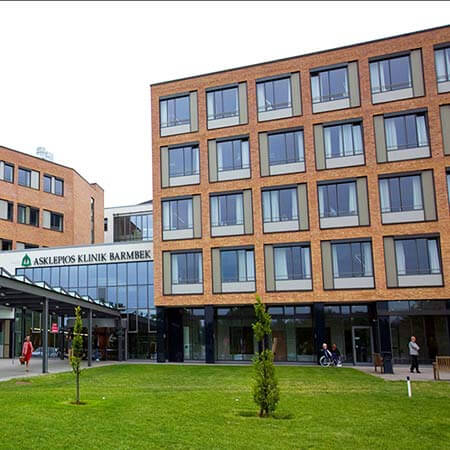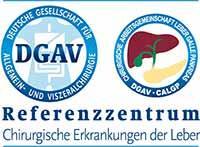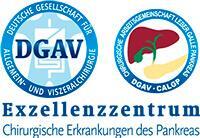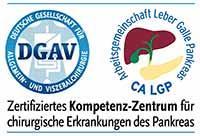HIPEC - Hyperthermic Intraperitoneal Chemoperfusion in the Best Hospitals in the World
Treatment prices are regulated by national law of the corresponding countries, but can also include additional hospital coefficients. In order to receive the individual cost calculation, please send us the request and medical records.

Department of General and Abdominal Surgery, Hepatopancreatobiliary Surgery and Hernia Surgery
The Department of General and Abdominal Surgery, Hepatopancreatobiliary Surgery and Hernia Surgery offers the full range of services in the areas of its specialization. The department's surgical team successfully performs interventions for diseases of the stomach, esophagus, small intestine, large intestine, rectum, pancreas, liver, gallbladder, and bile ducts. Patients with various types of hernias, including inguinal, umbilical, and incisional hernias, are also operated on here. It should be noted that the department also performs cytoreductive surgery with hyperthermic intraperitoneal chemotherapy (HIPEC), which is an advanced treatment method for peritoneal carcinomatosis. The specialists at the medical facility strive to provide patients with not only effective but also as sparing treatment as possible. That is why the use of minimally invasive surgical techniques is a priority. Such an approach to treatment practically eliminates surgical risks and reduces the duration of a hospital stay. The department has the status of an Expert Center for Liver and Pancreatic Surgery as well as a Competence Center for Upper Gastrointestinal Surgery, which is confirmed by the certification from the German Society for General and Visceral Surgery (DGAV). In addition, the medical facility regularly demonstrates high success rates in the surgical treatment of gastrointestinal cancers, which are confirmed by the certification from the German Cancer Society (DKG).







Department of General, Abdominal, Transplant, Hepatopancreatobiliary, Colorectal, Endocrine, Bariatric Surgery and Hernia Surgery
The Department of General, Abdominal, Transplant, Hepatopancreatobiliary, Colorectal, Endocrine, Bariatric Surgery and Hernia Surgery provides the full range of services in the areas of its specialization and holds a leading position at the national and international levels in terms of the number of surgical interventions performed and their success. Of particular interest are operations for treating diseases of the bowel, stomach, esophagus, pancreas, liver, gallbladder, and bile ducts, and endocrine glands. The department's doctors have excellent skills in the surgical treatment of cancer, surgery for liver, kidney, pancreas, and small intestine transplants, and operations for morbid obesity. The department's operating rooms are the pride of the medical facility, since they have all the necessary technical options for performing operations with the da Vinci surgical system, image-guided interventions, and endoscopic surgical procedures, which are characterized by minimal trauma rates.







Department of General and Abdominal Surgery, Hepatopancreatobiliary Surgery, Colorectal Surgery, Endocrine Surgery, Hernia Surgery and Bariatric Surgery
The Department of General and Abdominal Surgery, Hepatopancreatobiliary Surgery, Colorectal Surgery, Endocrine Surgery, Hernia Surgery and Bariatric Surgery offers the full range of effective surgical treatments in accordance with modern medical standards. Operations of varying complexity are performed on the stomach, colon, pancreas, liver, gallbladder, bile ducts, rectum, thyroid gland, and parathyroid glands in the department's operating rooms every day. The department's primary focus is the surgical treatment of malignant gastrointestinal tumors. The medical facility is certified in this area by the German Cancer Society (DKG). The team of endocrine surgeons specializes in the treatment of diseases of the thyroid gland, parathyroid glands, and adrenal glands. Patients with morbid obesity are also successfully operated on here. In their work, the department’s specialists primarily use minimally invasive surgical techniques, which virtually eliminate trauma to healthy tissue during the intervention. The department's operating suite is equipped with an innovative da Vinci Surgical System, which allows the doctors to perform sparing and high-precision surgical interventions. The specialists of the medical facility strictly adhere to hygiene and safety standards and create the most comfortable conditions for each patient during their hospital stays.






Peritoneal carcinomatosis is an affection of the peritoneum by cancer metastases. It most often occurs in colorectal cancer and cancer of the stomach.
Content
- Overview
- Symptoms of peritoneal carcinomatosis
- Diagnostics
- Treatment of peritoneal carcinomatosis
- Indications for HIPEC
- How HIPEC is carried out
- Postoperative period
- Where can I undergo HIPEC for colorectal cancer treatment abroad?
- The cost of colorectal cancer treatment with HIPEC
- How can I undergo HIPEC abroad?
Peritoneal carcinomatosis is affection of the peritoneum with metastases of tumors of the abdominal, pelvic and retroperitoneal organs.
HIPEC, hyperthermic intraperitoneal chemotherapy, is an alternative method of chemotherapy in which chemotherapy drugs are directly placed into the abdominal cavity.
With HIPEC, there are almost no side effects of chemotherapeutic agents. The results of HIPEC are also better due to the high dosage of the drugs and their active penetration into the tissues.
In most cases, HIPEC is performed after the open surgery, so recovery takes up to 7-10 days.
The Academic Hospital Asklepios Barmbek Hamburg, University Hospital of Ludwig Maximilian University of Munich, and Charite University Hospital Berlin specialize in HIPEC for peritoneal carcinomatosis. On the Booking Health website you will find a list of clinics with prices for treatment.
Yes, it is possible. In advance, the experts will review your medical records, give you a cost estimate and send you an invitation for treatment.
Leave a request on the Booking Health website and a medical advisor will contact you within 24 hours.
Overview
Carcinomatosis is one of the most unfavorable types of colorectal cancer metastasizing. However, it is very common.
Generally, carcinomatosis is a process of the malignant cells spreading, which subsequently leads to damage of the various organs in the human body. Such a process is often observed at the last stages of colorectal cancer. It manifests itself in the form of damage to organs such as the abdominal cavity organs and pleura.
Peritoneal carcinomatosis isn’t considered an independent pathological process. It is rather a complication of previous cancerous formations.
The malignant cells move inside the body through the blood. Moving along the abdominal cavity, the altered cells penetrate its structures, which leads to damaging other organs, regardless of where they are located.
In most cases, doctors find out that patients with carcinomatosis have a severe form of cancer, which is very difficult to cure.
Symptoms of peritoneal carcinomatosis
Since peritoneal carcinomatosis is not an independent disease, its clinical picture is determined by both the clinical manifestations of the primary tumor and the signs of the secondary malignant lesions.
The most common symptom is the presence of the fluid in the abdominal cavity, the so-called ascites. Ascites is often the only symptom in patients with peritoneal carcinomatosis. Also, there may be some non-specific signs, such as significant weight loss, nausea, vomiting, severe fatigue, and weakness.
The main signs indicating the development of a malignant lesion of the peritoneum include:
- Dull, aching pain in the abdomen. It can be either permanent or disturb the patient for periods of several hours or days.
- Abdominal enlargement with rapid weight loss. An enlarging abdomen is formed due to the accumulation of fluid in the abdominal cavity (ascites).
- Severe indigestion. Patients have nausea and pain in the abdomen; vomiting is also possible. Difficulties arise with defecation; often constipation is interchanged with diarrhea.
- Increasing symptoms of intoxication. Severe weakness, sweating, fever, pain in muscles, and headaches. Patients feel exhausted.
- Presence of a tumor that is palpable through the anterior abdominal wall.
The diagnosis is established taking into account the medical history of patients, clinical manifestations, laboratory and instrumental research data.
Diagnostics
Modern oncology centers have all the resources for accurate diagnostics of peritoneal carcinomatosis.
On the day of arrival at the oncology center, a consultation with the attending physician takes place. Doctors examine patients and study the anamnesis.
Further, all diagnostic measures are taken. The standard examination plan for peritoneal carcinomatosis includes the following procedures:
- CT. CT is conducted to obtain layer-by-layer images of the affected organ.
- Blood tests.
- Abdominal ultrasound examination. Modern ultrasound equipment detects even small loci of colorectal cancer.
- MRI.
- Biopsy. A biopsy is conducted to obtain material for histological examination.
- Diagnostic laparoscopy.
After receiving the results, doctors elaborate the therapeutic scheme for patients.
Treatment of patients with diagnosed peritoneal carcinomatosis is rather complicated. Currently, there are no standard methods of radical treatment of this cancerous process, so the colorectal cancer treatment is strictly individual.
Treatment of peritoneal carcinomatosis
For almost the entire history of oncology, it was believed that peritoneal carcinomatosis in patients with colorectal cancer did not respond to any of the existing treatments.
For a long time, patients with peritoneal carcinomatosis were considered incurable. And to this day, many doctors hold the same opinion. Patients with colorectal cancer are often "discharged" from the hospital because "there are no oncologists in hospitals treating carcinomatosis." When they come to modern oncology centers and find information about the possibility of colorectal cancer treatment with HIPEC, it turns out that this is the first time they hear about such a technique.
In most hospitals treating patients with colorectal cancer radiation therapy is not used due to its inefficiency in the treatment of peritoneal carcinomatosis. High doses of radiation are dangerous for patients with colorectal cancer and this treatment is usually connected with severe complications.
Conventional surgical treatment is also ineffective as metastases on the surface of the peritoneum can be very small, or located in inaccessible places, and the doctor simply does not see them during the surgery.
Systemic chemotherapy has almost no effect on peritoneal carcinomatosis as cancer cells of this type practically do not contact the system of blood vessels, and therefore are not available for systemic intravenous chemotherapy.
Treatment of peritoneal carcinomatosis is now possible by combining surgical intervention with the use of hyperthermic intraperitoneal chemotherapy.
The goal of the procedure is to destroy the maximum amount of cancer cells that remain even after the most thorough surgical removal of the lesions and cause colorectal cancer recurrence.
The essence of the HIPEC technique is that immediately after the cytoreductive (that is, aimed at removing tumor cells) surgery on the abdominal organs, patients are perfused for 60-90 minute with a concentrated chemotherapy drug, heated up to 42-43°C.
Both adjectives are important in the name "hyperthermic intraperitoneal chemotherapy"."Hyperthermic" stands for the rise of temperature.
The high temperature itself is capable of causing damage or death of cancer cells. Besides, it makes them more vulnerable to chemotherapy drugs.
Another important feature of hyperthermic intraperitoneal chemotherapy (HIPEC) is that it promotes more active penetration of the drugs into the tissues. This is enough to destroy most metastases remaining after surgery.
Hyperthermic intraperitoneal chemotherapy (HIPEC) acts directly on cancer cells. Moreover, drugs practically do not "leak" into the general bloodstream through the peritoneum.
This makes it possible to use the concentration of chemotherapy drugs in HIPEC that are 20, 50, and sometimes 100 times higher than the ones used in systemic chemotherapy. Cancer cells inside the abdominal cavity receive lethal doses, and the whole body practically does not suffer from side effects.
One of the main advantages of HIPEC is that sometimes it can be the only way to prolong the life of a person at the last stages of colorectal cancer.
Indications for HIPEC
For surgery followed by HIPEC to be effective, several conditions must be met:
- Patients must be able to undergo both surgery and chemotherapy at the same time. Health conditions of patients should allow the treatment. Before the procedure, patients are examined thoroughly.
- The spread of metastases should be limited to the abdominal cavity only.
How HIPEC is carried out
Surgical intervention with the use of hyperthermic intraperitoneal chemotherapy is carried out in two stages: first, surgical removal is conducted, and then the chemotherapy drugs are introduced.
Surgical intervention and hyperthermic intraperitoneal chemotherapy are separate but equally important steps in a single therapeutic regimen. For maximum cancer treatment efficacy, both stages should be carried out one after the other.
The HIPEC procedure is the second half of a whole range of measures. Without the cytoreductive surgery, HIPEC can be performed in a few cases with specific indications. Typically, the HIPEC is a continuation of the surgical procedure, which significantly improves the prognosis of survival.
Together with the surgical removal of the cancerous tumor, the entire intervention takes from 6 to 18 hours. The process can be divided into 4 stages.
- Additional examination of the abdominal cavity.
It is carried out to understand whether treatment with HIPEC is indicated for patients and whether it will increase the life expectancy. The examination is performed intraoperatively, just before the main surgical intervention.
- Cytoreductive surgery.
Some sections of the peritoneum, where the primary tumor originates from, adjacent internal organs, or their parts, are removed if they are also affected by metastases. Often these are areas of the intestines, spleen, and gallbladder.
- Hyperthermic intraperitoneal chemotherapy.
The actual HIPEC. Catheters and temperature sensors are inserted into the abdominal cavity, connected to a special device, and a container with a chemotherapy drug. After the procedure, the drug is removed from the abdominal cavity, it is washed with saline solution, and the sensors and catheters are removed.
- Reconstructive surgery.
If parts of the intestine are removed, the surgeon restores the functioning of the intestine with the help of a colostomy (brings the end of the intestine to the surface of the abdomen for defecation restoring).
On average, patients spend 2-4 weeks in the oncology center. A control examination is performed in 2-3 weeks after the surgical intervention. It must be repeated in 3 months, and after that the frequency of examinations is reduced to one per year.
Postoperative period
The postoperative period is a separate stage, but it is no less important. We understand how difficult the recovery period can be for patients with extremely serious conditions. Therefore, immediately after the surgery patients are transferred to the intensive care unit and stay under the constant medical supervision.
Complications can be the same as after any surgical intervention on the abdominal cavity organs, therefore, the patient is closely monitored in order to notice signs of bleeding or inflammation of the postoperative wound timely.
Side effects of chemotherapy drugs with intraperitoneal hyperthermic chemotherapy are even less pronounced and the antitumor effect is ten times higher in comparison with the intravenous chemotherapy administration.
Where can I undergo HIPEC for colorectal cancer treatment abroad?
The best success rates in hyperthermic intraperitoneal chemotherapy (HIPEC) are demonstrated by:
- Academic Hospital Asklepios Barmbek Hamburg, Germany
- University Hospital of Ludwig Maximilian University Munich, Germany
- Charite University Hospital, Germany
- University Hospital Ulm, Germany
- University Hospital Marburg UKGM, Germany
You can check out the full list of hospitals on the Booking Health website.
The cost of colorectal cancer treatment with HIPEC
The prices in hospitals listed on the Booking Health website are relatively low. With Booking Health, you can undergo cancer treatment in the best hospitals in the world at an affordable price.
The cost varies, as the price for treatment depends on the hospital, the diagnosis, and the complexity of treatment:
- The price for treatment in Germany is from 35,633 EUR to 62,794 EUR
- The price for treatment in Israel is approximately 45,200 EUR
- The price for treatment in Turkey is approximately 27,700 EUR
The final cost may differ from the prices mentioned above. To make sure that the price for treatment is suitable for you, contact us by leaving the request on the Booking Health website.
Hyperthermic intraperitoneal chemotherapy (HIPEC) meets the definition of medical necessity and should be covered by insurance. Contact your insurance company to find out the details.
How can I undergo HIPEC abroad?
It is not easy to choose the right hospital that ensures a successful HIPEC procedure. It is vital to have accurate information on the success rates of the hospital in colorectal cancer treatment.
We have up-to-date information on colorectal cancer treatment in the best hospitals in the world. Booking Health will help you select a hospital, taking into account your wishes and the indications for colorectal cancer treatment.
We want to help you during this difficult period and take on all the issues. You can be free of unnecessary stress, while Booking Health takes care of all organizational issues. Our goal is to find the best facility for colorectal cancer treatment for you.
Cancer can be treated! The earlier you start the treatment, the higher the chances of returning to your day-to-day life. All you need to do is to leave the request on the Booking Health website and our manager will contact you shortly.
Authors:
The article was edited by medical experts, board-certified doctors Dr. Vadim Zhiliuk and Dr. Nadezhda Ivanisova. For the treatment of the conditions referred to in the article, you must consult a doctor; the information in the article is not intended for self-medication!
Sources:

